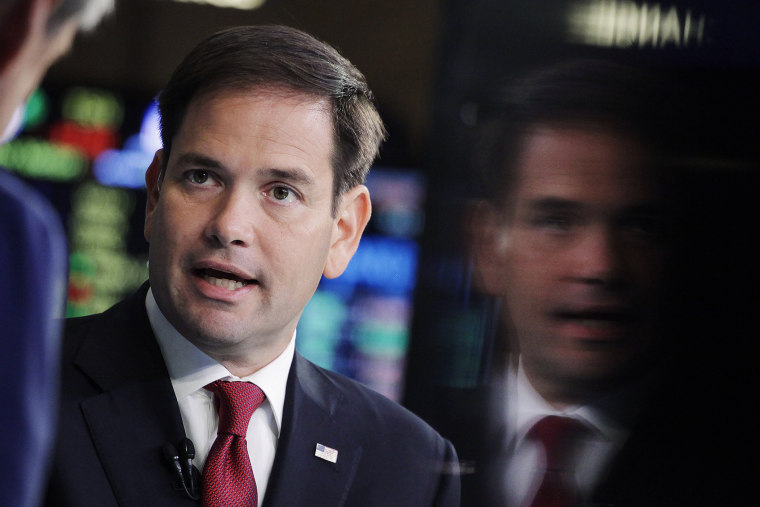It may seem like ancient history, but 2013 wasn't that long ago. It was just two years ago that Sen. Marco Rubio (R-Fla.), eager for any kind of major legislative accomplishment, co-wrote a bipartisan, comprehensive immigration reform package, helping make the young, far-right senator a prominent GOP voice on a major national issue.
Soon after, however, the Republican base decided the legislation constituted "amnesty," prompting the Floridian lawmaker to begin running away from his own failed initiative.
As Rubio's presidential campaign picked up, so too did the intensity of his shift to the right-wing cliff on immigration. Last week, the Senate Republican
said policymakers shouldn't even begin to have a conversation about possibly considering a pathway to citizenship for undocumented immigrants
until 2027 -- after Rubio plans to have served two terms in the White House.
This week, the GOP candidate sat down with CNBC's John Harwood, and he
continued to reject the ideas he used to support.
HARWOOD: You pushed that Senate bill that had a path to citizenship after a number of years that ended with people -- they had 10 years they could apply for a green card, right? RUBIO: Right, some of them. Right. The ones that qualify. HARWOOD: That's right, and you've said more recently you support letting them go for a green card still but no special path. As you know, the Senate bill had a special path... Do you still support that provision? RUBIO: No, because we can’t pass it.
The senator added he's "convinced" that policymakers cannot address the immigration issue in one comprehensive package, which is itself a bizarre argument. Less than a year ago, a comprehensive solution enjoyed the support of the White House, a majority of the Senate, a majority of the House, a majority of the public, the Chamber of Commerce, labor leaders, reform advocates, law enforcement, and the faith community.
How can Rubio be "convinced" an idea is impossible when we already know how plainly possible it was as recently as 11 months ago? And more to the point, why should anyone take Rubio seriously on an issue when he goes out of his way to disagree with his own policy positions?
Sarlin's piece is well worth your time in fleshing out the substantive details, and pay particular to the point about the broader political dynamic surrounding Rubio's deliberate "fuzziness."
If Rubio so chose, after he won his party’s nomination, he could tack towards the reform side with a much more specific and achievable plan as to how he would implement legalization without violating any of his present statements. If he decided to go the opposite route and fire up the anti-immigration right, he could name a more specific and extremely difficult criteria for allowing legal status that may never happen. Whether you’re a conservative opponent of immigration reform or a progressive supporter, it’s hard to truly evaluate Rubio’s position -- until he fills in the gaps.
That's true, and it's important. Even when Rubio denounces policies he helped write, he hedges on the rationale -- the senator generally emphasizes his assessment of provisions' legislative prospects, not his personal views. It all seems carefully calculated to help leave the career politician with some wiggle room to exploit later.
But let's be clear about why this matters: what Rubio is demonstrating isn't leadership. It's effectively the opposite -- call it anti-leadership.
The Florida lawmaker could present the electorate with detailed positions on what used to be his signature issue, but Rubio fears the political consequences of specificity. Instead, when he's not simply contradicting himself outright, the Republican candidate keeps things alarmingly and deliberately vague, creating exits for himself -- just in case Rubio decides it suits his political interests to further abandon previous commitments.
One of the knocks on Rubio in GOP circles is that he's a career-long follower. His assorted, vacillating positions on immigration only serve to reinforce the criticism.
